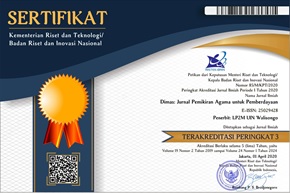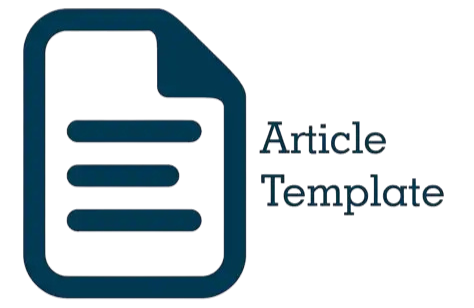Smart al-Quran Reading Program with the Bil Hikmah Method to Improve the Quality of Students' Reading of the Al-Quran
DOI:
https://doi.org/10.21580/dms.2024.241.21785Keywords:
Read Al-Qur’an, bil hikmah, motivationAbstract
This community service activity was carried out on March 10-25 2024, which was attended by 20 participants who were members of the TPQ Husnul Khatimah Mosque, Bandung. This program was carried out based on partners' needs related to evaluating the implementation of the learning program, namely the lack of student attention to the quality of Al-Quran reading due to the weakness of the iqro method. To obtain maximum results, this program is carried out using a participatory method with a service learning model. This program runs well and smoothly in accordance with the stages outlined in the activity implementation schedule. This can be seen from the achievement of training objectives and the enthusiasm and activeness of participants in training activities. The results achieved through this program are very significant in increasing participants' knowledge and skills in reading the Al-Quran according to the rules of recitation, as well as increasing motivation in studying the Al-Quran by paying attention to the quality of Al-Quran reading.
Downloads
References
Abdul Majid Khon. (2011). Praktikum Qira’at, keanehan bacaan AlQur’an Qira’at Ashim dari hafalan.
Aisyah, S. (2020). Literasi Al-Qur’an Dalam Mempertahankan Survivalitas Spritulitas Umat. Al-Iman: Jurnal Keislaman Dan Kemasyarakatan, 4(1), 203–228. http://ejournal.kopertais4.or.id/madura/index.php/aliman/article/view/4441
Akhiruddin, & Dkk. (2019). Belajar dan Pembelajaran.
Arfina, A., Nita, Y., & Khairiyati, K. (2019). Pengaruh Membaca Al-Qur’an Terhadap Kecemasan Pada Lanjut Usia Di Panti Sosial Tresna Werdha (PSTW) Khusnul Khotimah Pekanbaru. Health Care : Jurnal Kesehatan, 8(1), 49–53. https://doi.org/10.36763/healthcare.v8i1.41
Darabinia, M., Heidari Gorji, A. M., & Afzali, M. A. (2017). The effect of the Quran recitation on mental health of the Iranian medical staff. Journal of Nursing Education and Practice, 7(11), 30. https://doi.org/10.5430/jnep.v7n11p30
Dewi, N. A., Ghiast, N., & Matnur, R. (2022). Peran TPQ Dalam Meningkatkan Kualitas Kemampuan Baca Al-Qur’an Pada Anak Di TPA Ar-Rahmah. Jurnal Pendidikan Dasar Dan Sosial Humaniora, 1, 1842.
Dian, N., Moh. Iqbal, M., & Sugiyarta, S. (2018). Efektivitas Membaca Al-Qur’an Untuk Menurunkan Stres Akademik Pada Siswa Kelas XI SMA Negeri 1 Kebumen. Intuisi : Jurnal Psikologi Ilmiah, 10(1), 59–71.
Fajriani, D. (2019). Implementasi Metode UMMI untuk Meningkatkan Kemampuan Bacaan Al-Quran Siswa di SMPIT Anni’mah Margahayu. Jurnal Pendidikan Islam Indonesia, 3(2), 325–333. https://doi.org/10.35316/jpii.v3i2.137
Hanifah, H. (2016). Kenal, Dekat, dan Akhirnya Jatuh Cinta Pada Al-Quran. https://books.google.com/books?hl=en&lr=&id=hCxIDwAAQBAJ&oi=fnd&pg=PP1&dq=keimanan+%22al+quran%22&ots=DO1nlzlaJ1&sig=V7QW8H6h9Ct2ozsEUOeIbvBvkE8
Hidayah, S., & Zumrotun, E. (2023). Penggunaan Metode Qiro’ati Dalam Pembelajaran Membaca Al-Quran Di Sekolah Dasar. Attadrib: Jurnal Pendidikan Guru Madrasah Ibtidaiyah, 6(2), 353–364. https://doi.org/10.54069/attadrib.v6i2.601
Indriani Nurzaman. (2014). Efektivitaspenggunaan Metode Bil Hikmah Terhadap Tingkat Kemampuan Membaca Al-Qurān Anak Usia Dini. Tarbawy, 1(1), 33–43.
Irawati, P., & Sri Lestari, M. (2017). Pengaruh Membaca Alquran terhadap Penurunan Tekanan Darah pada Klien dengan Hipertensi di RSK Dr. Sitanala Tangerang. Jurnal Ilmiah Keperawatan Indonesia [JIKI], 1(1), 35. https://doi.org/10.31000/jiki.v1i1.281
Muamanah, S. (2018). Peningkatan Kemampuan Santri Membaca Al- Qur’an Melalui Pendekatan Ilmu Tajwid Buku Standar Tajwid Bacaan Al-Qur’an Karangan Maftuh Basthul Birri (Studi Di Pondok Pesantren Ittihadut Tholibin Wonosobo). Paramurobi: Jurnal Pendidikan Agama Islam, 1(1), 117–127. https://doi.org/10.32699/paramurobi.v1i1.182
Muhammad Rohman, & Sofan Amri. (2012). Mananjemen Pendidkan.
Muslikah Suriah. (2018). Metode Yanbu’a untuk Meningkatkan Kemampuan Membaca Al-Quran pada Kelompok B-2 RA Permata Hati Al-Mahalli Bantul. Jurnal Pendidikan Madrasah, 3(2).
Nurseha, A., & Saputra, A. (2023). Upaya Guru PAI Dalam Mengatasi Kesulitan Belajar Baca Tulis Al-Quran. Journal of International Multidisciplinary Research, 1(2), 1062–1073.
Sukron. (2018). Perbedaan Efektvitas Terapi Musik Klasik dan Terapi Murrotal terhadap Tingkat Kecemasan Pasien Pre Operasi Bedah Mayor. Jurnal Ilmiah Multi Science Kesehatan, 9(1), 1–15. https://jurnal.stikes-aisyiyah-palembang.ac.id/index.php/Kep/article/view/115
Tazkiyah Basa’ad. (2016). Membudayakan Pendidikan Al-Qur’an. Jurnal Tarbiyah Al-Awlad, VI(02), 594–599.
Wahyudi, R., & Wahidi, R. (2017). Metode Cepat Hafal Al-Qur’an Saat Sibuk Kuliah. In Yogyakarta: Semesta Hikmah.
Yudhani, E., Suharti, V., Adya, A., & Utami, E. S. (2017). Efektivitas Membaca Dan Mentadabburi Al-Qur’an Dalam Menurunkan Kecemasan Siswa Yang Akan Menghadapi Ujian Sekolah. Psikoislamedia : Jurnal Psikologi, 2(1), 23. https://doi.org/10.22373/psikoislamedia.v2i1.1821
Downloads
Published
Issue
Section
License
Copyright
The copyright of the received article shall be assigned to the journal as the publisher of the journal. The intended copyright includes the right to publish the article in various forms (including reprints). The journal maintains the publishing rights to the published articles. Therefore, the author must submit a statement of the Copyright Transfer Agreement.*)
Licensing

This work is licensed under a Creative Commons Attribution-ShareAlike 4.0 International License.
In line with the license, authors are allowed to share and adapt the material. In addition, the material must be given appropriate credit, provided with a link to the license, and indicated if changes were made. If authors remix, transform or build upon the material, authors must distribute their contributions under the same license as the original.
_______
*) Authors whose articles are accepted for publication will receive confirmation via email and send a Copyright Transfer Agreement.









